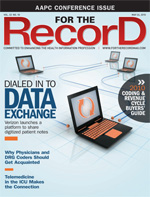 May 24, 2010
May 24, 2010
Coding for Delirium
For The Record
Vol. 22 No. 10 P. 27
Delirium is a sudden, severe, fluctuating confusion that is usually reversible. It involves a disturbance in mental function, including decreased awareness and confused thinking, and is characterized by the inability to pay attention or think clearly, disorientation, and fluctuations in alertness levels.
Delirium usually has a sudden onset and may last a few hours or as long as a few weeks. Some common causes of delirium include a severe or chronic medical illness, certain medications, surgery involving the use of anesthesia, drug or alcohol abuse, infections such as pneumonia, poisons, fluid or electrolyte disorders, stroke, dementia, Parkinson’s disease, and hospitalization (eg, ICU). Medications that can cause delirium include opioids (eg, morphine, meperidine), sedatives (eg, benzodiazepines, sleep aids), antipsychotics, antidepressants, over-the-counter antihistamines, stimulants (eg, amphetamines), cimetidine, corticosteroids, levodopa, and muscle relaxants.
The ICD-9-CM code assignment for delirium may depend on the type and the underlying cause. Codes for delirium include the following:
• Acute delirium (also documented as acute confusional state) — 293.0;
• Alcoholic delirium (includes acute, with delirium tremens, or unspecified and acute/unspecified alcoholic withdrawal) — 291.0 (Use an additional code for alcohol abuse [305.00 to 305.03] or alcohol dependence [category 303], if documented.);
• Alcohol withdrawal delirium, chronic (includes chronic alcohol withdrawal) — 291.1;
• Arteriosclerotic dementia with delirium — 290.41 and 437.0;
• Chronic delirium — 293.89;
• Delirium, not otherwise specified — 780.09;
• Delirium due to eclampsia in pregnancy — category 642;
• Drug-induced delirium — 292.81 (Use an additional code to show drug dependence [category 304] or drug abuse [category 305]. If the drug-induced delirium was caused by an adverse effect of a medication, assign code 292.81 followed by the E code to identify the drug.);
• Eclamptic delirium (not in pregnancy) — 780.39;
• Exhaustion delirium — category 308;
• Hysterical delirium — 300.11;
• Presenile dementia with delirium — 290.11;
• Senile dementia with delirium — 290.3;
• Subacute delirium — 293.1; and
• Uremic delirium — categories 584 to 586.
If the delirium is due to a physical or neurological condition, then assign a code for the specific condition documented followed by code 293.0 for acute delirium, 293.89 for chronic delirium, 293.1 for subacute delirium, or 293.9 for unspecified delirium. For example, acute delirium due to a urinary tract infection is assigned to codes 599.0 and 293.0.
Symptoms
Symptoms commonly associated with delirium include an inability to stay focused; decreased alertness; getting stuck on one idea rather than engaging in conversation; distractibility; poor memory (especially short-term); confusion about time or place; difficulty speaking or recalling words; rambling speech; difficulty understanding speech; difficulty reading or writing; hallucinations; agitation, irritability, or combative behavior; inactivity or minimal, slow activity; disturbed sleep habits; and personality changes.
Diagnosis
A diagnosis of delirium is based mainly on a patient’s symptoms. The physician may perform an assessment that tests for mental state, confusion, perception, and memory. Physical and neurological exams, and blood, urine, and brain imaging tests may also be performed to check for other problems and underlying causes.
Treatment
The goal when treating delirium is to control or reverse the symptoms. Treating the underlying condition, such as stopping the affecting medication or treating the infection, will also treat the delirium. Some medications that may be used to delirium include the following:
• dopamine blockers (eg, haloperidol, olanzapine, risperidone, clozapine);
• mood stabilizers (eg, fluoxetine, imipramine, citalopram);
• sedating medications (eg, clonazepam, diazepam);
• serotonin-affecting drugs (eg, trazodone, buspirone); and
• thiamine.
Providing supportive care will also help reverse delirium. This includes a calm, comfortable environment to help keep the patient oriented.
Coding and sequencing for delirium are dependent on the physician documentation in the medical record and application of the Official Coding Guidelines for inpatient care. Also, use specific AHA Coding Clinic for ICD-9-CM and American Medical Association CPT Assistant references to ensure complete and accurate coding.
— This information was prepared by Audrey Howard, RHIA, of 3M Consulting Services. 3M Consulting Services is a business of 3M Health Information Systems, a supplier of coding and classification systems to more than 5,000 healthcare providers. The company and its representatives do not assume any responsibility for reimbursement decisions or claims denials made by providers or payers as the result of the misuse of this coding information. More information about 3M Health Information Systems is available at www.3mhis.com or by calling 800-367-2447.



